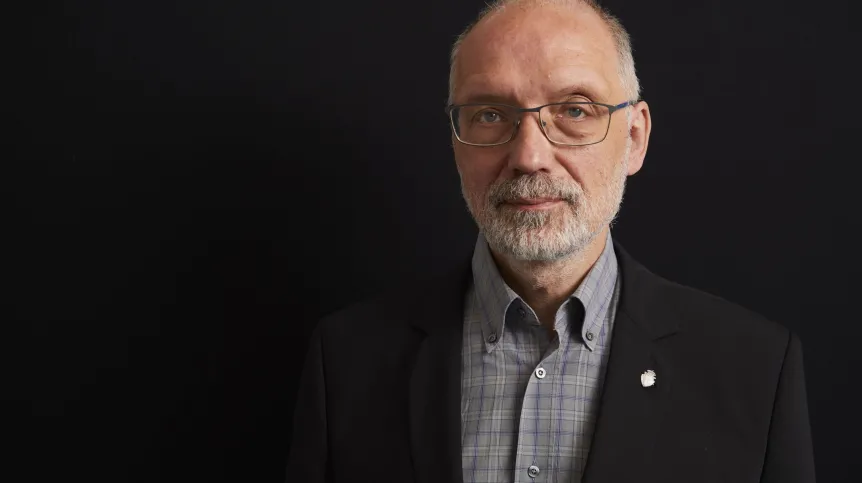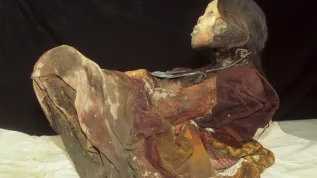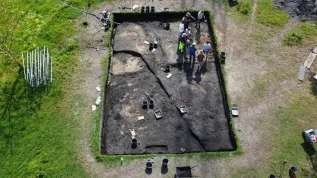
The traditions of Polish and Moscow, later Russian political cultures are polar opposites, says historian Professor Andrzej Nowak from the Jagiellonian University and the Polish Academy of Sciences, the author of the recently published book Polska i Rosja. Sąsiedztwo wolności i despotyzmu X-XXI w. (Poland and Russia. The Neighbourhood of Freedom and Despotism in 10th-21st century).
Polish Press Agency: In your new book, you describe Polish-Russian relations. When whould you say the relations between Poland and Russia began?
Professor Andrzej Nowak: Pinpointing the exact moment in history, when these relations started, is not easy, because there still is a dispute on from when we can actually talk about Russia. This dispute is about the heritage of the first East Slavic state, Kievan Rus, founded in the 9th century. This dispute is political and still valid, as the war in Ukraine shows. Russia, the state entity built only around Moscow from the 15th century, claims to be the exclusive successor of Kievan Rus. According to the interpretation used for centuries and now promoted by Vladimir Putin, this means that Russia has the right to Kiev, and in fact to the entire Ukraine, which is consistent with the centuries-old ideology of uniting the Russian lands.
The author of this ideology was the Grand Duke of Moscow Ivan I Kalitá, who announced the imperial ambition of Moscow in the beginning of the 14th century. He decided that this provincial northern duchy on the edges of the former Kievan Rus would become its successor and conquer all lands that originally belonged to this first East Slavic state. From that moment, we can talk about an ambition to create the future of Russia, although for two more centuries the country was still called 'Moscow', not 'Russia'.
The second key moment was a strategic breakthrough that took place in mid-17th century, when, following the tragic internal conflicts in Poland, which occurred after the Cossack uprising under the leadership of Bohdan Chmielnicki, Moscow captures the Eastern half of Ukraine. It is from that moment that we can say that this is not just Moscow, but Russia, which annexes countries calling it the unification of Russian lands and leads expansion under the slogan of the freeing the world in the name of salvation of all people by Eastern Orthodoxy, the only true religion. This is the concept of Russkij mir (Russian world) combined with imperial politics and the Eastern Orthodox idea of the Reconquista.
PAP: Your book has a meaningful subtitle: The Neighbourhood of Freedom and Despotism...
Professor Andrzej Nowak: The traditions of Polish and Moscow, later Russian political cultures are polar opposites. I'm not saying that this has been determined since the earliest times, but we can undoubtedly see this trend at least from the moment the Moscow state appeared and autocracy became its ideology. The idea was that there is one ruler, and all subjects are slaves of the Great Duke , and later Tsar. In this common slavery, they were comforted by the fact that the Tsar was conquering new nations and would eventually become the ruler of the whole world.
In Poland, on the other hand, a political system based on the principle of agreement between the ruler and subjects who became citizens developed in Poland from the late Middle Ages. Although it only concerned the nobility, this group was exceptionally numerous and formed the largest political nation, a nation of free people in the then Europe. Traditions of the Parliament, local parliaments, self-government, political representation that defends its freedom, are the essence of the tradition of the Polish-Lithuanian Commonwealth.
Tsarist autocracy continued after Russia entered Europe together with Peter I. Even when it made a modernization effort, it did not change its political system. Tsarist autocracy changed into enlightened despotism, whose symbols became were Peter I and Catherine the Great - the monarchs, who ruled their subjects with no less brutality and conquered further nations around Russia with no less energy than the Ivan III, the actual creator of the power of the Moscow state, or Ivan the Terrible.
Russian culture undoubtedly Europeanised in the 18th and 19th centuries. This cultural flourishing of Russia deserves admiration, but it did not change the political system, the Tsarist, imperial political culture. That culture developed through conquest and acquisition of ever new people, new talent, in the area of compulsory Russian identity. I will give two examples of Russian composers, whose names every music lover in the world knows - Igor Stravinsky and Dmitri Shostakovich.
Shostakovich was a great-grandson of Polish insurgents, grandson of Polish independence activists, but as a result of deportation to Siberia and assimilation in the local environment, in the third generation, the composer's parents became Russians. Thus, a man with Polish roots and family history of rebellion against Russia, became a symbol of great Russian music. Igor Stravinsky, in turn, was the descendant of a Polish senator, who became a Russian as a result of the imperial law. In the case of Catholic and the Eastern Orthodox mixed marriage, children had to be raised in the Orthodox faith. The composer's father had to accept Eastern Orthodoxy because he came from a mixed marriage. I am talking about this to highlight the fact that Russian culture, which is often cited as an example of European aspirations of Russians, is also closely linked to expansive imperialism at the cost of neighbours.
I would like to mention one more artist. Alexander Pushkin's poetic genius is admired in Russia and in the world. But let me remind that he also authored the so-called anti-Polish trilogy, a set of chauvinistic poems that fuelled Russian hatred of the West, in particular Poland. They were inspired by a sense of threat to the empire by the Polish 'rebellion', the November Uprising. These poems are taught in Russian schools and constitute a basis for chauvinistic education in Vladimir Putin's Russia. We see Pushkin as the author of Eugene Onegin, a beautiful love story. At the same time, the same author teaches generations of the Russians to hate Poland, the West, teaches them imperial pride (for example in the poems The Captive of the Caucasus , The Bronze Horseman and in his drama Boris Godunov) - and this aspect is more important in Russia than beautiful words about love.
PAP: Which factors shaped Polish-Moscow, and then Polish-Russian relations?
Professor Andrzej Nowak: This conflict was very difficult to avoid. I have already mentioned the differences in political culture. It is worth noting, however, that the first factor was the different religion. The division line between the Eastern Orthodox and Latin world existed almost from the beginning of our relationship. Rus and its ruler Vladimir the Great accepted Byzantine Christianity in 988, and twenty-two years earlier Prince Mieszko I was baptised in the Latin rite. This, of course, did not prevent friendly relations or matrimonial unions between neighbouring duchies or rulers in the first centuries after the baptisms. Rurikids often married Piast daughters and vice versa. This faith difference did not determine hostility from the beginning, but undoubtedly contributed to cultural distrust.
This divide grew when in the 14th century Moscow started using Eastern Orthodoxy as an ideological weapon, and when in the 16th century it started to refer to the ideology of Moscow as the third Rome, according to which the Kremlin ruler was obliged to 'free' the whole world for the Eastern Orthodoxy because he was the only ruler of the Orthodox empire. Moscow was to be a new capital of the eternal empire, the third (after Rome and Constantinople) and last capital, with a mission of conquest and above all the alleged liberation of Orthodox believers in other countries. This, of course, set Moscow against the Polish-Lithuanian state, where a large part of the residents of the Grand Duchy of Lithuania were Orthodox.
The geopolitical factor was also important. There are always territorial disputes between neighbours, but they do not always have such strategic significance as in the case of Russian-Polish relations. When Russia stood firmly on the Dnieper and used the Cossack Uprising to annex the eastern half of Ukraine, it became clear that it wanted to continue its expansion to the south, towards the Danube and the Black Sea, or north to the Baltic Sea. It had to clash with the Polish-Lithuanian Commonwealth which was on the path of this expansion. If Russia wanted to become a European superpower and dictate conditions to Europe, it had to conquer and subordinate Poland.
Ultimately, not only the Polish-Lithuanian state succumbed, having failed to get any aid from European countries to stop the expansion of Russian imperialism, but Russia has found partners in partitioning the Commonwealth among European powers - the Austrian Habsburg Monarchy and the German Kingdom of Prussia. This situation shows a dangerous trend in our relations. Russian expansion alone is a dangerous for us, but it becomes a much greater threat when Russia finds partners in the west.
PAP: Could the relations between Poland and Russia have been good? Was there a way to avoid this conflict?
Professor Andrzej Nowak: There was one such moment in history, at the end of the 17th century, during the reign of Jan III Sobieski. After the Commonwealth recognized the annexation of half of Ukraine by Russia in 1686, Russia achieved its phase goal in this conflict, and the Commonwealth was still a large and sovereign country. During the years until the end of the century, there were no conflicts between Russia and Poland, neither of these countries was subject to the other, nor was it an object of penetration and political domination by the other.
Moscow even saw a unique phenomenon of fashion for Polish culture. At the Moscow court, people began to speak Polish, wear Polish clothes, paint Sarmatian style portraits, read Polish literature. This was due to the fact that for the moment Russia was satisfied with the successes of its expansion towards the West, and despite the conflicts, in the west, Poland was culturally closest to Russia.
All this changed when Peter I took power and started a new stage of Russia's expansion towards the west. The Tsar did not want peace with Poland - he wanted to completely subordinate it to his plans to make Russia a power ruling over the entire eastern half of Europe. He effectively did so. Poland became a country formally allied to, and in fact completely subordinated to Russia, destroyed from the inside by Russian influence. This state of affairs continued practically from the beginning of the 18th century to the 20th century, strengthened with the final partition, of course. From 1815, Russia ruled over 82 percent of the area of the partitioned Poland; Prussia - 7%, Austria - 11% In order to regain independence, Poles had to fight against Russia.
PAP: Could the collapse of the Soviet Union have brought a certain normalization of Polish-Russian relations?
Professor Andrzej Nowak: The chance to improve Polish-Russian relations appeared with the collapse of the USSR in 1991. Remember that the Soviet Union collapsed not only as a result of the revolt of 'non-Russian' republics such as Lithuania, Latvia, Estonia and Ukraine, but also because of the rebellion of Russia itself against the imperial structure. Boris Yeltsin, who opposed Mikhail Gorbachev as the leader of the Soviet Union, became a symbol of this rebellion.
In the first years of his presidency, especially in the years 1991-1993, in his politics Yeltsin strongly emphasized the need to account for the crimes of communism. He decided to tell the truth about the Katyn massacre, which was very important to us. It was the moment when we were able to reconcile on the basis of the truth about the communist crimes, the victims of which were mostly Russians, and also Poles. There was the prospect of viewing communism as the most criminal system and reconciliation on the basis of the truth about the crimes of the 20th century, which made all, however tragic, historic parts of Polish-Russian relations pale in comparison.
Yeltsin, however, abandoned this policy under pressure from the Russian public that did not want to break with the Soviet Union, the imperial glory of which was quickly missed by the majority. In this situation, any attempt to settle accounts for the communist, Soviet past, in which Poles could reconcile with the Russians, was stopped by the post-Soviet elites.
The fruit of this bad change was the election of KGB Lieutenant Colonel Vladimir Putin as Yeltsin's successor. From the very beginning, Putin clearly and consistently promoted the policy of re-imperialising Russia, rebuilding at least Russian rule at least within the former Soviet Union, or rather restoring Russia's status from Joseph Stalin's time. To this end, he used various tools - both brutal ones, such as terrorist attacks on his own population and military aggression against his neighbours, and less brutal, but no less effective, such as the Falin-Kwiecinski gas doctrine, where instead of tanks, gas pipes could be used to make Russia's neighbours, as well as more distant European countries, dependent and subordinated. Remember that the topic of Putin's doctoral dissertation was the gas industry. He also used this method of making other countries dependent on Russia also against Poland.
However, the most important breakthrough in Polish-Russian relations took place in 2008, when the new government in Poland broke with the so-called Giedroyc doctrine, previously applied in relations with Russia. This principle was that we would talk to Russia only after we had communicated and established good and safe relations with our immediate eastern neighbours, especially Ukraine. According to this doctrine, Russia could not be preferred at the expense of Ukraine. Meanwhile, the then Polish government decided to 'reset' our relations with Putin's Russia - in fact against Ukraine, as shown by the first visits to Moscow at the beginning of 2008, first by Minister Sikorski, then Prime Minister Tusk, while Putin was putting a 'gas gun' to the then Ukrainian government's head at the time. The Polish government clearly declared: only the 'reset' with Russia counts, the Giedroyc doctrine is dead.
In 2009, Putin was invited to the celebration of the 70th anniversary of the outbreak of World War II held at Westerplatte. While President Lech Kaczyński defended the historical truth about the role of Russia, or rather the Soviet Union, in starting that war, government officials distanced themselves from our president and pretended that Russia under Putin's rule was 'the most free and democratic' in its history. It was an unwise approach, especially after August 2008, when Russia attacked Georgia and took a large part of its territory from the sovereign state. To humiliate Polish fans of the 'reset' of relations with Russia, as Donald Tusk's government welcomed Putin at Westerplatte, the Russian army for the first time practiced a tactical nuclear attack on Warsaw as part of the Zapad military exercise. The course of this exercise was well known, which means that Polish politicians had to know about it. All this led to the disaster that happened on April 10, 2010. And it was the saddest breakthrough in Polish-Russian relations.
PAP: What is the future of Polish-Russian relations? What conditions must Russia meet for these relations to exist?
Professor Andrzej Nowak: Polish-Russian relations may be what they are today, that is, hostile. I mean inter-state relations, not interpersonal relations, but they must remain hostile as long as Russia does not deviate from its ideology of imperial domination over its neighbours and geopolitical goals designed to make Europe energetically dependent on Russia. As long as it is accompanied by the political culture of autocracy, state despotism and imperial domination over Russia's neighbours, relations with Poland may not be good. Poland must defend its political interests and political culture, and it cannot even agree to pretend that one can maintain good relations with Russia.
A change may come when Russia completely subjugates Poland. Then, these relations will be as 'good' as in the times of the Polish People's Republic, under Bierut and Stalin. Really good relations can be established when Russia renounces the centuries-old tradition of autocracy and imperial expansion. I am afraid, however, that it would only be possible in a situation similar to that in Germany in 1945. I mean the shock that the Russian elites would have to experience. They must understand that the path of imperial conquest and autocracy leads to nowhere. Only after the real failure of Russia's imperial project will a real reset in Polish-Russian relations be possible. (PAP)
Interview by Anna Kruszyńska
Author: Anna Kruszyńska
akr/ skp/ kap/
tr. RL













